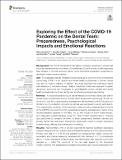Files in this item
Exploring the effect of the COVID-19 pandemic on the dental team : preparedness, psychological impacts and emotional reactions
Item metadata
| dc.contributor.author | Humphris, Gerry M. | |
| dc.contributor.author | Knights, Jennifer | |
| dc.contributor.author | Beaton, Laura | |
| dc.contributor.author | DeAraujo, Mariana | |
| dc.contributor.author | Yuan, Siyang | |
| dc.contributor.author | Clarkson, Janet | |
| dc.contributor.author | Young, Linda | |
| dc.contributor.author | Freeman, Ruth | |
| dc.date.accessioned | 2021-04-29T08:30:13Z | |
| dc.date.available | 2021-04-29T08:30:13Z | |
| dc.date.issued | 2021-04-29 | |
| dc.identifier | 273554375 | |
| dc.identifier | dfebd8f5-9111-446a-b267-bca80ec2f11d | |
| dc.identifier | 85119876332 | |
| dc.identifier.citation | Humphris , G M , Knights , J , Beaton , L , DeAraujo , M , Yuan , S , Clarkson , J , Young , L & Freeman , R 2021 , ' Exploring the effect of the COVID-19 pandemic on the dental team : preparedness, psychological impacts and emotional reactions ' , Frontiers in Oral Health , vol. 2 , 669752 . https://doi.org/10.3389/froh.2021.669752 | en |
| dc.identifier.issn | 2673-4842 | |
| dc.identifier.other | ORCID: /0000-0002-4601-8834/work/93161372 | |
| dc.identifier.uri | https://hdl.handle.net/10023/23101 | |
| dc.description | The work was supported by NHS Education Scotland and University of St Andrews provided the open access publication fee. | en |
| dc.description.abstract | Background: The COVID-19 pandemic has placed increased demands on clinical staff in primary dental care due to a variety of uncertainties. Current reports on staff responses have tended to be brief enquiries without some theoretical explanation supported by developed measurement systems. Aim: To investigate features of health and well-being as an outcome of the uncertainties surrounding COVID-19 for dentists and dental health professionals in primary dental care and for those in training. In addition, the study examined the well-being indices with reference to normative values. Finally a theoretical model was explored to explain depressive symptoms and investigate its generalisability across dentists and dental health professionals in primary dental care and those in postgraduate training. Methods: A cross-sectional survey of dental trainees and primary dental care staff in Scotland was conducted in June to October 2020. Assessment was through “Portal,” an online tool used for course bookings/management administered by NHS Education for Scotland. A non-probability convenience sample was employed to recruit participants. The questionnaire consisted of four multi-item scales including: preparedness (14 items of the DPPPS), burnout (the 9 item emotional exhaustion subscale and 5 items of the depersonalisation subscale of the MBI), the 22 item Impact of Event Scale-Revised, and depressive symptomatology using the Patient Health Questionnaire-2. Analysis was performed to compare the levels of these assessments between trainees and primary dental care staff and a theoretically based path model to explain depressive symptomology, utilising structural equation modelling. Results: Approximately, 27% of all 329 respondents reported significant depressive symptomology and 55% of primary care staff rated themselves as emotionally exhausted. Primary care staff (n = 218) felt less prepared for managing their health, coping with uncertainty and financial insecurity compared with their trainee (n = 111) counterparts (all p's < 0.05). Depressive symptomology was rated higher than reported community samples (p < 0.05) The overall fit of the raw data applied to the theoretical model confirmed that preparedness (negative association) and trauma associated with COVID-19 (positive association) were significant factors predicting lowered mood (chi-square = 46.7, df = 21, p = 0.001; CFI = 0.98, RMSEA = 0.06, SRMR = 0.03). Burnout was indirectly implicated and a major path from trauma to burnout was found to be significant in primary care staff but absent in trainees (p < 0.002). Conclusion: These initial findings demonstrate the possible benefit of resourcing staff support and interventions to assist dental staff to prepare during periods of high uncertainty resulting from the recent COVID-19 pandemic. | |
| dc.format.extent | 11 | |
| dc.format.extent | 623126 | |
| dc.language.iso | eng | |
| dc.relation.ispartof | Frontiers in Oral Health | en |
| dc.subject | COVID-19 | en |
| dc.subject | Dental team | en |
| dc.subject | Burnout- professional | en |
| dc.subject | Psychology | en |
| dc.subject | Depressive symptoms | en |
| dc.subject | Preparedness | en |
| dc.subject | Impact of events | en |
| dc.subject | SEM modeling | en |
| dc.subject | RA0421 Public health. Hygiene. Preventive Medicine | en |
| dc.subject | RK Dentistry | en |
| dc.subject | 3rd-DAS | en |
| dc.subject | SDG 3 - Good Health and Well-being | en |
| dc.subject.lcc | RA0421 | en |
| dc.subject.lcc | RK | en |
| dc.title | Exploring the effect of the COVID-19 pandemic on the dental team : preparedness, psychological impacts and emotional reactions | en |
| dc.type | Journal article | en |
| dc.contributor.institution | University of St Andrews. Sir James Mackenzie Institute for Early Diagnosis | en |
| dc.contributor.institution | University of St Andrews. Population and Behavioural Science Division | en |
| dc.contributor.institution | University of St Andrews. WHO Collaborating Centre for International Child & Adolescent Health Policy | en |
| dc.contributor.institution | University of St Andrews. Health Psychology | en |
| dc.contributor.institution | University of St Andrews. St Andrews Sustainability Institute | en |
| dc.contributor.institution | University of St Andrews. School of Medicine | en |
| dc.identifier.doi | 10.3389/froh.2021.669752 | |
| dc.description.status | Peer reviewed | en |
| dc.identifier.url | https://www.frontiersin.org/articles/10.3389/froh.2021.669752/full#supplementary-material | en |
This item appears in the following Collection(s)
Items in the St Andrews Research Repository are protected by copyright, with all rights reserved, unless otherwise indicated.

